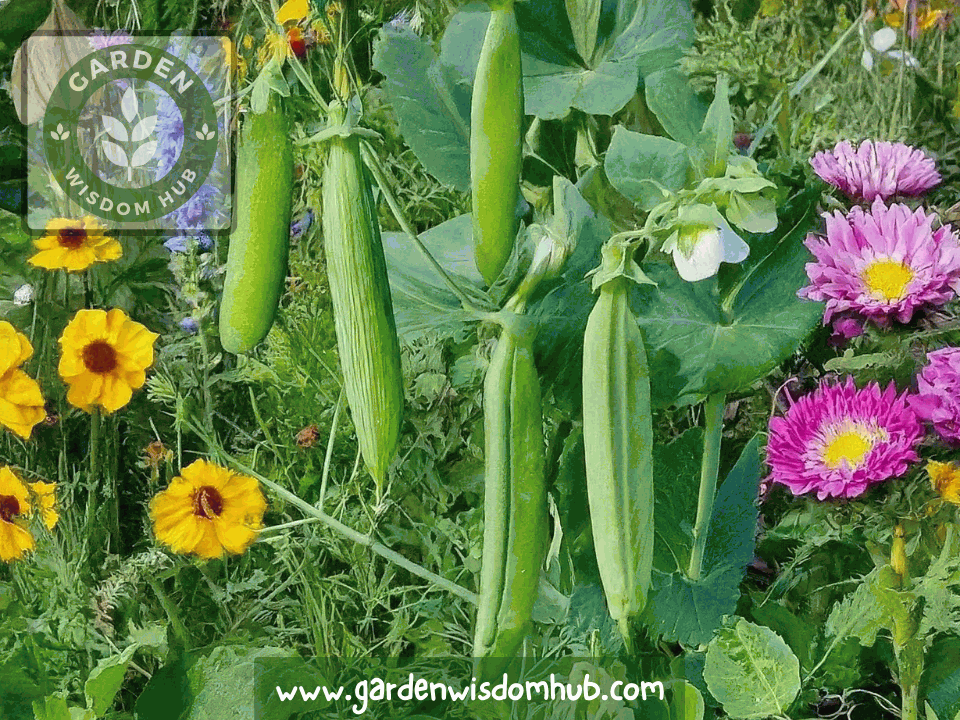Peas fix nitrogen in the soil and encourage surrounding plants, making them garden unsung heroes. It feels like they are throwing a party and inviting everyone. This procedure fuels the flames, but positively! Imagine giving the soil a nitrogen boost, like a VIP pass for tall, robust plants. Imagine that your plants have a hidden weapon that guarantees success. Read this article till the end to explore the answers to the following questions:
- What is a good companion plant for peas
- What to plant with peas
- Companion planting with peas
- Companion planting for peas
Best Companion Plants For Peas: What To Plant With Peas?
Companion plants for peas are a blessing. Growing peas in pots is easy. They require little and can complement a range of veggies, herbs, and flowers, making your garden a powerhouse. Peas and their plant friends are the perfect garden partners! Companion plants with peas create an amazing powerhouse.
Pea companion plants: vegetables:
Let’s talk about vegetables. Our meals benefit from these overlooked culinary treasures, which enhance flavor and texture. No matter how much you adore carrots or broccoli, these vegetables are powerful. These are great.
Beans:
Let’s talk about beans like peas, beans are great for the soil. They enrich the soil by fixing nitrogen. These plants match their sun and water needs perfectly. Both are alike.
Carrots:
Carrots are the garden’s MVPs, adding flavor to any dish. They don’t try to outshine the peas! In collaboration, they promote water and air movement to make the soil healthy. You’re the MVP! Look who’s a great gardener.
Corn:
If you’re thinking about planting sugar snap or snow peas, know that they love corn. Yes, what I’m saying is true! Corn is a relaxed friend for these peas, offering shade and a natural trellis. It is like gardening paradise brought them together!
Cucumbers:
Cucumbers love nitrogen. Like small fans, they can’t get enough. Peas are great for nitrogen-fixing soil. They are party animals. They love to multitask.
Early potatoes:
Did you know that early potatoes can protect your peas from Mexican bean beetles? It is a clever approach to protect and grow plants! Pea neighbors also give potatoes nitrogen. This win-win arrangement will delight your veggies.
Radishes:
Radishes guard your peas from beetles and other pests like garden bouncers. Imagine having your security detail!
Turnips:
Turnips provide water and oxygen to peas, producing a comfortable and loose habitat.
Beets:
Beets are the perfect garden friend, calmly doing their own thing and letting peas breathe.
Companion flowers for peas:
Flowers captivate our emotions with their beautiful beauty and unlimited joy. These happy tiny bundles bring sunshine to any environment. They seem to magically lighten even the dreariest days, making us grin.
Marigolds:
These are nature’s beauty. These flowers are garden superheroes, repelling pests with their natural powers. These plant defenders are the botanical tough boys, preventing bugs from passing. These marigolds will help you construct a pest-free, flower-filled garden. Your plants will thank you for these tiny yet formidable protectors. These cute critters add appeal to any garden and can be used to generate natural beauty in the garden,
Companion herbs for peas: Companion plant peas:
Let’s talk about herbs. These cute critters are like the hidden ingredient that provides flavor and excitement to our meals. These amazing ingredients delight our taste receptors. A teaspoon of basil or a sprinkle of thyme can enhance a dish’s taste. Guess what?
Mint:
It repels pests like a superhero. A secret the original article didn’t include! Imagine a minty guardian angel watching over your peas. Mint must not run wild and take over the garden! It can be difficult.
Basil:
Basil repels aphids and adds a delicious taste to peas. This condition favors everyone! Talk about peas and their plant friends! Marigolds are peas’ best friends! These cute, tiny things keep pests away and brighten your landscape.
Importance of companion planting with peas:
These cute critters protect peas from unpleasant insects like garden guardians. Additionally, these plants can be simply incorporated into many landscape designs. Great result for everyone! Herbs and peas are delicious.
Peas taste great with mint and basil. Fresh and fragrant peas lend creativity to any dish. Next time you boil peas, add mint and basil to boost the flavor! These herbs are garden superheroes, keeping pests away and producing a warm environment for peas. These men are the best protection peas never knew they needed! Mint may quickly take over your landscape, so put it in containers.
Planting peas with the right companions might boost their development and success. Discover a great collection of companion plants that will enchant your landscape. Timing is everything with peas. Therefore, plant them in early spring or late summer when the weather is appropriate for a good autumn harvest.
Peas and their plant friends are the perfect garden partners! Companion plants with peas create an amazing powerhouse. I promise that those peas will be thrilled! It’s all about the climate, so remember that.
Companion planting onions and peas: companion planting with peas:
How lovely! Onions can deter those pesky pests that love to eat our peas, my friend. They protect the vegetable kingdom, keeping troublemakers in check. Use the onion squad to scare away pea pests.
Monitor their growth to avoid them squabbling over nutrition like hungry hippos! Garden mates for snow peas are fantastic! They appreciate spending time with other pea types and enjoying their camaraderie.
What to grow with peas: companion planting with peas:
How about adding plant companions? Planting them with beans, carrots, or marigolds will stimulate their growth! I can’t modify text without context or content.
Finding the right plant companions for peas helps them grow. There are many vegetables to grow. Some of them are the following:
- Beans
- Carrots
- Corn
- Cucumbers
- Early potatoes
- Radishes
- Turnips
- Beets
By mixing these vivid crops, beginner gardeners or students may create a beautiful garden. Marigolds, mint, and basil provide flavor and boost garden health and output. This is a great opportunity that you should not miss.
Companion plants for Snow Peas:
Consider companion planting a plant buddy system. It is a clever method to company your plants. Enhancing their growth, outsmarting pests, and maintaining soil health are all important. Companion planting is a great way to spice up your gardening.
Final Comments
Planting peas with friends might boost your garden. With their ingenious plant alliances, these nitrogen-fixing plants keep pests away as well as fix nitrogen in the soil. Planting peas changes your garden. It’s like killing two birds with one stone; you get to bring humor to your garden and boost productivity and the environment. Buckle up and enjoy your garden harvest! It will be an exciting ride.
Amazing facts:
Entertaining and engaging Trivia Peas:
These are stealthy legumes that fix nitrogen. These tiny creatures convert air nitrogen into plant-friendly form, boosting soil and reducing our need for chemical fertilizers. A superhero by nature!
Pest control:
Peas choose their garden friends well! They have smart cookies like marigolds and radishes. These plants cooperate to fight pests, producing a natural, effective pest management system.
Like having a team of plant defenders at your disposal! Peas are the garden’s best disguises. These plants blend into any garden arrangement, from rows to eccentric container gardens, like chameleons. Peas support beginners and experts. Always willing to help.
For More Guide Watch this Video YouTube Related to: Companion Plants For Peas
Frequently Asked Questions
Do peas and tomatoes make the oddest garden couple?
Are they the neighbors that always borrow sugar and have amusing misunderstandings? That would be fun! Like trying to make peas and tomatoes friends—they don’t get along! It will be a war for nutrients and space. It’s like separating apples and oranges and letting them mature. Don’t mix them up and make a fruit salad disaster.
What makes peas so good for the soil?
Peas save the day by fixing nitrogen, which plants can’t get enough of. It boosts their growing potential! They get this nutrition and gladly share it with their plant friends.
When should I plant peas?
Timing is everything with peas! Plant them in early spring or late summer when the weather is appropriate for a good autumn harvest. I promise those peas will be thrilled! It’s all about the climate, so remember that.
Should I plant peas with onions?
Of course! In gardening, peas and onions go together. Onions are your pea’s best defense against pests. Your crop gets a new flavor boost from them, like a secret ingredient. Give them enough space to develop without competing for nourishment.
To learn more about Vegetable Garden Check out Our Guides:
Vegetables to Grow in a Raised Bed from Seed
Complete Guide When to Pick & Harvesting Carrots
Ultimate Flowers to Plant Guide
Best and Worst Carrot Companion Plants
Ultimate Guide to Growing Carrots in Containers
Top 10 Fruits to Grow in a Raised Bed
A Guide to Spring Garlic Planting
James Porter
Welcome to our haven of gardening and plant care, where outdoor and indoor planting enthusiasts come together! At Gardening Wisdom Hub, we aim to provide you with the most authentic information on anything related to gardening, plant care, seasonal planting etc.
The author of our website is James Porter, an experienced industry veteran. He has a deep interest in everything green. James’s enthusiasm for exploring plants’ features and learning new gardening methods began at a young age. Gradually, his passion increased with time, leading him to become a highly esteemed professional. His extensive knowledge makes him a priceless resource for inexperienced and seasoned gardeners.

